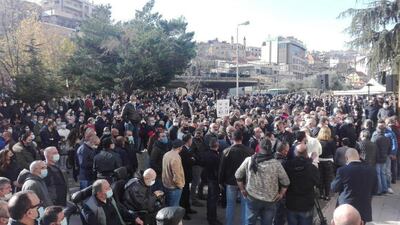The Lebanese government has less than two weeks to pass a law before the capital of the Bekaa valley and surrounding areas go dark. Zahle, Lebanon’s fourth-largest city, and 17 other villages have been enjoying uninterrupted electricity supply in a country where daily power cuts are the norm.
Electricité de Zahlé (EDZ), a private company, has been supplying electricity around the clock to Zahle and surrounding areas since 2015 as part of a contract with state-owned Electricité du Liban (EDL).
But that contract, which expires December 31, will have to be renewed by passing a bill in parliament before year-end for the private company to stay operational.

Two bills have been proposed so far – one by lawmakers affiliated with the Lebanese Forces and the Future Movement, and the other by their political rivals, the Free Patriotic Movement. The former would extend the contract with EDZ for another two years, while the latter would extend the contract by 12 months on the condition that a bid is held for competitors during this time.
Parliament is expected to meet on December 21, to discuss a long list of topics, including a hybrid proposal endorsed by the Parliament’s Public Works Committee, which renews the contract by 24 months, with the opportunity for other companies to bid to take over once it expires.
“If it’s not passed on Monday, then it will be too late to pass a bill,” said Naji Jreissati, a senior director and engineer with EDZ.
Last week, hundreds of residents gathered in Zahle’s centre and blocked the main highway leading in and out of the city to protest against the delay in extending EDZ's contract and the possibility of the state retaking control of the district’s electricity grid. They included both citizens worried about power cuts and EDZ staff fearful of losing their jobs.
“If we have to shut down our operation because we’re obliged by law, there aren’t even generators set up to fill the gap. The city will fall into complete darkness,” Mr Jreissati said.
Bishop Issa Darwish of Zahle
Electricity in Lebanon has been an issue since the end of the country’s 15-year civil war in 1990. Most Lebanese households get as little as three to six hours of electricity a day through EDL, which charges subsidised rates. To make up the shortfall, Lebanese must pay local private operators of generator sets. Since installing its own power generators in 2015, EDZ has been able to provide 24-hour electricity to the 300,000 residents of the Bekaa Valley through the state-owned grid.
EDZ was founded in the early 1920s to generate and distribute electricity, long before EDL monopolised power production in the 1970s and granted private companies only rights to distribution.
Today, EDZ purchases electricity from EDL and manages its distribution through the state-owned grid while turning on its own power generating plants during daily scheduled power cuts to maintain an uninterrupted supply.
On average, EDZ provides the area’s residents with electricity at two-thirds of the cost that residents of other areas incur. While Zahle residents settle one EDZ-issued monthly bill, power users in other areas have to pay EDL as well as private generators that charge higher rates.
Mr Jreissati said the uninterrupted power supply at cheaper rates had fuelled a business boom in the district.
“Our electricity supply has definitely increased economic activity in the Bekaa. A lot of our subscribers were new agricultural businesses that opened. There was a huge boom. There was even a company that opened just to make mozzarella cheese,” Mr Jreissati said.
The city’s elected officials and religious authorities have thrown their weight behind EDZ’s efforts to secure a contract renewal.
Bishop Issa Darwish of Zahle and MPs Michel Daher and George Ouaiss have met Parliament Speaker Nabih Berri and urged him to renew the contract.
Mr Darwish warned that a failure to do so would harm both businesses and the environment.
“If the contract isn’t renewed, it means that hundreds of random generators will bring noise and air pollution back to the city, which is catastrophic,” he said.
But even if the contract is renewed, EDZ faces another challenge from Lebanon's economic crisis. The Lebanese pound has lost about 80 per cent of its value against the US dollar over the past year as foreign currency reserves dwindled, affecting the import of fuel for power plants.
“Assuming the contract with EDZ is renewed, another big looming challenge is the ongoing fuel crisis,” Mr Jreissati said, referring to the government’s plan to cut subsidies on fuel imports.
Bashir Assi, a Zahle resident who lost his job a few months ago, warned of a “revolution” if people are forced to turn to private generators.
“They’re trying to take us backward. Most people including myself won’t be able to afford a generator. In Zahle, the homes and businesses will go dark on January 1.”

